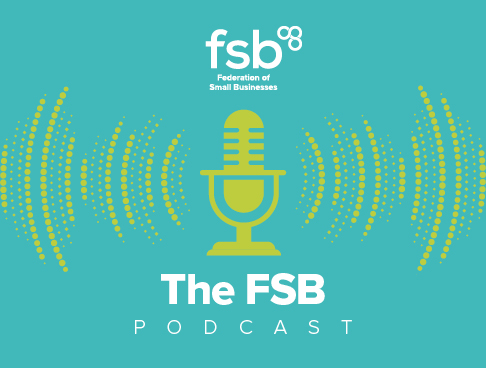Exploring why the UK’s high streets are on the cusp of transformation, and how the small business voice can be at the heart of that. And doing a stock-take on international trade for small businesses after some new research, we ask how small businesses are managing the complexity at the moment.
Featuring:
Episode transcript:
Jon Watkins 0:10
Welcome to this latest FSB monthly round-up podcast the go to podcast for news tips and important information for small businesses and the self employed. This episode is our July 2023, small business roundup in which we'll take a look at some of the important issues hitting the headlines at the moment, and which you need to be aware of as small business owners. This month, we will be diving into two topics that are particularly pertinent to small businesses right now, and where FSB is particularly active right now. To begin, we'll be speaking to FSPs Kerry Curtis, on some work that FSB is doing to gain insights into the role of our high streets and what the future of the high street might look like. So that's something that will be important to an awful lot of our members. And then you Yupina Ng is going to run us through some new findings about international trade for small businesses, including some tips on how small firms can manage their international trade, and the admin that goes with it. Thanks very much, both of you for joining.
Kerry Curtis 1:16
Thank you, Jon.
Jon Watkins 1:17
Good to have you here. Kerry, I'm gonna kick off with you if that's okay, you're here to chat to us about this new survey FSB is running around the future of the High Street. Can you tell us exactly why you've launched this?
Kerry Curtis 1:30
Yeah. Hi, Jon. Thanks for having us on today. Yeah, so we've we've launched this huge new flagship survey, the future of the High Street, we've done it. We've done it now, because the UK's High Street. So really on the cusp of transformation. And it's crucial, really, that the small business voice influences upcoming policy. I mean, as you all know, our high streets first became a central place of commerce, trade and community during the Industrial Revolution. And we're obviously in a very different place now. So what we're saying is, it's a time to reimagine the high street with creative thinking, but it must be backed by real public policy. So the new policies being decided over the coming year or so are fundamental to the future of our high streets, our conurbations and our economies. So that's why this summer FSB's embarked on this huge UK wide survey, to get small businesses to take part so that we can gather their experiences and their views, then we can analyse that data, we can look at their challenges and the ways that they're operating. And from that, we can pull together a raft of recommendations. So, you know, the bigger and more diverse the sample we get, the more impact the findings can have. So we want small businesses from across, you know, all the UK nations and regions and of all types of businesses to take part because of course, you know, it's not just retail and hospitality on and around the High Street. It's, you know, it's professional services. Its hair and beauty businesses, health care businesses, like opticians and physiotherapist and chiropodist. It's gyms and fitness centres, b2b businesses, you know, the motor industry, taxis, transport, arts organisations, you know, it affects all our High Street businesses. And you know, it affects the way that we as a country will live and work in the future. So what we're saying to small businesses out there is please, could you spare seven or eight minutes, take part in the survey, have your say, and, by taking part you'll also be in with a chance of winning £250 cash in a prize draw as a little thank you, which you could then spend on your local high street. But of course, that's up to you.
Jon Watkins 4:17
Yeah, sounds like a big piece of work and a big call to arms. We've seen a big shift in consumer habits, not least as a result of the pandemic. So does the high street still have a pivotal role to play and how do you see evolving from it?
Kerry Curtis 4:32
Okay, so, you know, digitisation has changed, consumer markets have changed and our lifestyles are very different, you know, the ways we live work and study. And some of that was perhaps triggered or speeded up by the pandemic and the lock downs. But but not all of it. And it certainly opened up lots of opportunities as well as challenges for small businesses, so we're really at a tipping point now to transform the high streets shore up our economy. For the century, and FSB, what we'd really like to see is a resurgence of small High Street businesses and a new golden age of the High Street. I mean, we'll know that you'll know yourself, Jon, but just in the last few years, there's been a decline in chain retailers and some of the big familiar anchor stores on the high street such as Debenhams, Pizza Express, Toys'R'Us, Paperchase, to name a few. But at the same time, we've seen lots of Independent Businesses emerge on the high street, barbers, interesting eateries, artisian, food markets, micro breweries, community libraries, independent gyms. So we're already witnessing a kind of as well as that a new mixed use of the High Street in some areas. So for example, the creation of small business co working spaces, or we've seen examples of councils taking on old offices to provide services, we've seen artists using disused department stores. So these are examples where we're reimagining spaces whose original purposes, is now from a completely different era. And the right policies could see new innovations, for example, like creating new local banking services through the post office. So this is why it's so crucial that those public policies are put in place to see this kind of continued expansion and reimagining of our high streets.
Jon Watkins 6:55
Yeah, brilliant. That's really good. We talked a lot about the survey and wanting the views of small businesses, how can they go about taking part?
Kerry Curtis 7:04
So if you just have a look on FSPs, website, fsb.org.uk, fsb.org.uk. From the homepage, there will be a link direct to the survey.
Jon Watkins 7:19
Great stuff and what will happen with the information that you're gathering? How does FSB plan to use it to help shape the future of the High Street as you refer to it?
Kerry Curtis 7:30
So the findings will be analysed. And then those are those will then underpin a raft of policy recommendations for ministers and other decision decision makers. So at a UK level, for devolved administration's, and for local governments. And, you know, what we're really hoping is that the government and the opposition parties will adopt many of these recommendations as commitments in that general election manifestos next year.
Jon Watkins 8:06
That's really good stuff. Thank you, Kerry. And thanks for that update on on on that survey and what FSB plans to do with it. Yupina Ng thank you to you also for joining us, you're going to give us a bit of a stocktake as it were on international trade. For small businesses. This is something that we talk about a lot, especially how eager small firms are when it comes to exporting in terms of their capacity to handle custom procedures, though, how difficult and how different are small international traders compared to big corporates.
Yupina Ng 8:42
Yeah, thanks for having me Jon. When it comes to international trade, and in terms of resources, small international traders can be quite different from big corporates. And like big corporates, most small businesses don't have the specialised resources to deal with complex customs procedures. And in fact, both the small importers and exporters when it comes to moving goods from the EU or outside the EU, they have been overwhelmed by excessive amounts of paperwork in the past few years, and the lack of clear guidance on navigating border controls. Our customs clearance report finds that the smaller the businesses, the less likely they are to have the in house resources for customs and trade. And when we look at the statistic, only 9% of small firms have a dedicated staff member or a team to handle customs procedures and the paperwork. And many of these 9% have more than 50 employees. As a result, many of the small international traders are relying on intermediaries.
Jon Watkins 9:57
What are these intermediaries Yupina that we're referring to what types of intermediaries are there? And the small firms still face challenges trading overseas, even if they're using these kind of middlemen?
Yupina Ng 10:10
Yeah, when we talk about intermediaries, we are often referring to fast parcel operator 60% of small international traders use this type of intermediary when it comes to international trades. It could also mean a fright forwarder, or customs agents broker. And by using these middlemen doesn't mean that problems are solved. In fact, a third of respondents in our customs clearance report, say high intermediary fees is a challenge for overseas trade. And you also have to think about the smaller the businesses, they have to bear a higher costs because they are less able to commit to large volume of shipment and like big businesses, and they're less able to reach fixed price agreements or to negotiate with couriers and as businesses as adjusting to new UK and new trade relationships since the UK withdraw from the European Union, small international traders say they have been asked to pay fees attributed to post Brexit paperwork. But in many cases, there is a lack of clarity from intermediaries on what exactly this extra costs form. But of course, apart from these high intermediary fees, small international traders are also facing other challenges, for example, high shipping costs, losses and delays in transit and the lack of clear guidance on customs border.
Jon Watkins 11:52
Okay, what would FSB like to see done to address that issue of high cost intermediaries Yupina? And are there steps that you'd like to see taken in terms of lowering the cost of trade generally?
Yupina Ng 12:06
Yeah, so the figures have shown that in small international traders, are reliant on intermediaries, but that also means that a flourishing competitive and user friendly intermediary market is very important to the small business community. Currently, there is a government consultation on introducing voluntary standards for customs intermediaries to improve the quality of services. We welcome this consultation and we will be responding to this consultation. But for specific action, we would like to see from the government to monitor potential anti competitive behaviour resulting from supply chain disruption. And this could be done through the this could be done through the Competition and Markets Authority Five Eyes working group. We've also heard a lot about single trait window, which is a online protocol allows the traders or the intermediaries to submit all the data needed for border control in a standardised format. The government is currently in the process of building this single trait window, and we would like to see it to be a very small, business friendly single trait window. In general, we think policymakers should adopt a think small first approach when it comes to customs policy development, and really place more businesses at the heart of new trade and customs structures. To avoid disproportionate costs and administrative burdens. They should include commitments to robust piloting, and staggered implementation timelines.
Jon Watkins 13:51
Brilliant, thank you for being that's really, really insightful. While I have here, I just wanted to ask you about one slightly related issue, which is a sort of slight geographical shift that we're seeing at the moment with this. There's a growing community of small business owners who have relocated to the UK from Hong Kong. What's the what's the story there? And why is that happening?
Yupina Ng 14:14
Yeah, this story is one that close to my heart because I myself is also from Hong Kong. Around two years ago, in 2021, the UK Government announced a citizenship pathway for Hong Kong people who have a British national overseas passport. This is a passport issued during the British colonial era to those who were born before the handover of Hong Kong in 1997. Since the announcement of the citizenship pathway that UK has welcomed around 150,000 Hong Kongers . A lot of them are families and young professionals. We see a lot of them settle in London and Manchester, some of them in Scotland. Studies have shown around a third of these new arrivals from Hong Kong are considering starting a business in the UK. From what I've seen, for example, in my local high street, I have a bubble tea shop opened by a family of four from Hong Kong just last year. And right next to it, there is a hair salon also opened by Hong Konger. And opposite there is a tattoo parlour, also run by Hong Konger a conversation I have with them is apart from the challenges facing any kind of businesses up and down this country. They're also facing a language barrier. But this is often not the language itself, but their confidence in using their second language to market themselves, or negotiate contracts with their suppliers or talk to customer services of their energy companies. We've also heard from them why it is quite easy for them to tap into the Hong Kong community in the UK, they're very keen to reach to the local British market, but often don't know how or where to start, because there's also an element of cultural differences. And after all, you have to think that it is an entirely new environment to these Hong Kong entrepreneurs. Hong Kong in a way is very similar to the UK but also very different. So FSB we really keen to support this group of entrepreneurs, and help them achieve their ambitions. We are doing some outreach at the moment to make sure that they know that we have plenty of free resources available on our website, including steps by steps guidance for new startups, and the self employed, and the different knowledge hubs on legal marketing and international trade. And if they want to join FSB as a member, they will also be able to benefit from a range of membership exclusive business services. And of course, our Westminster team makes sure that small businesses across the country have the voice in the government, no matter what is your ethnic background.
Jon Watkins 17:11
Yeah, brilliant and more information on FSB and how they can take advantage of those things is of course available at the website at fsb.org.uk. That's really great. Thanks Yupina and thank you also Kerry, that brings us to the end of this small business round up for July I look at the small business announcements in the headlines right now. And I'd like to thank you again for taking part both of you thank you also to our audience for listening to this episode. While I have your attention. As always, I would like to just remind you that you can subscribe to the FSB podcast to receive regular updates and guidance on the big issues affecting small businesses. And do please also remember that you can find a whole host of additional webinars, podcasts and other content at the FSB website at FSB.org.uk Many thanks for listening.
Small business news on the go




